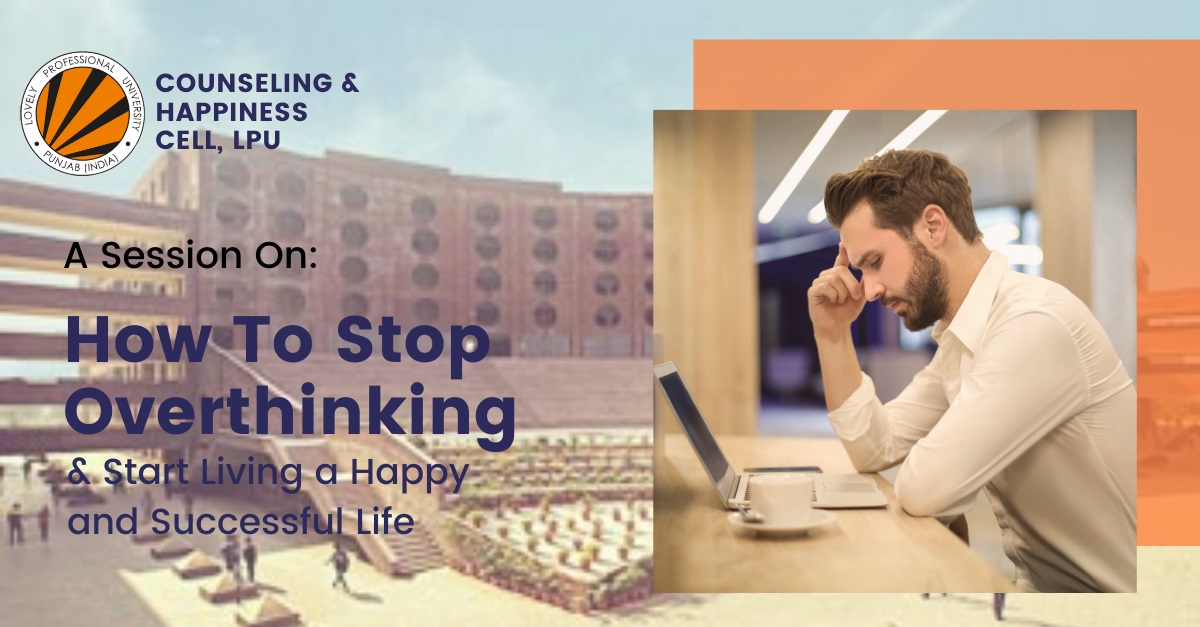Are you an overthinker? Well, if you are reading this article because the title caught your attention, then probably you are. This article is for the overthinkers who keep switching positions at night, for hours, when trying to have a sound sleep. It might be because your past haunts you or you are stressed about the future. You might wonder whether the person you trust as your best friend considers you the same. The reason can be one or many and it distracts us from everything. And we get more stressed.
This is the reason that the Counseling & Happiness Cell, under the aegis of Division of Student Relationship, LPU organized a session ‘How to Stop Overthinking & Start Living a Happy and Successful Life’. The session was taken by Ms. Malvinder Gill (HOD, Counseling & Happiness Cell), Ms. Anusuya Hazarika (Sr. Clinical Psychologist), and Ms. Anuradha (Counseling Psychologist) which concluded with a Q&A session. In this article, I am going to summarize the session and share some helpful details! You’ll find what overthinking is, signs that you are one, an activity proving that overthinking is just something we choose ourselves, the methods to stop overthinking, the techniques which are helpful when your anxiety is triggered and some problems discussed during Q&A.
Before starting with the solution part of overthinking, let’s discuss the problem first!
What is overthinking?
Simply defined, it is the art of creating problems when there aren’t any, making you unhappy. Is it what you do? Are you an overthinker? Not sure whether to consider yourself as one? Here are some of the signs that you might be an overthinker:
- You are constantly stressed,
- You are suffering from insomnia,
- You have a lot of regrets,
- Anxiety,
- You criticize yourself a lot,
- You try to read other’s mind,
- You hate and thus avoid taking decisions.
Can you relate to these symptoms? If yes, then read this article till the end!
Overthinking can affect both; personal and professional life. So, you must not take it lightly. It is the reason that you may have low self-esteem, always procrastinating, have low productivity, less creativity, issues in interpersonal relationships, etc.
With a very simple activity (Ms. Anusuya Hazarika, Sr. Clinical Psychologist, LPU asked to perform during the session), I can prove to you that you are being paranoid with the majority of things that make you overthink. Let’s move to the activity now:
- Pick a color, let’s say ‘yellow’. Now, count the number of yellows in your room (or wherever you are sitting right now).
- Your answer might be 0, 1, 2, 3, etc.
- How many times a day do you notice all the yellow things at that place?
- The general/ majority answer would be never or hardly ever, right?
So, see, you hardly or never focused on the yellows in your room before, until I asked you to. Do you get how this relates to your overthinking? It’s simple. What you deliberately want to see, you see. You wanted to focus on the yellows, you meticulously looked around and you did. And this is exactly what overthinking is. It’s you, who is focusing on one thing and giving it a thought over and over again and only you can stop it!
Moving on to the solution part, i.e. How to Stop Overthinking, let’s discuss some of the basic methods:
- Start Journaling:
Make a diary and start penning down your thoughts and daily activities. This will lighten your mood and find your anxiety triggers. Once you are aware of your triggers, you can work upon those by distracting yourself or perhaps by entirely avoiding them. (During the Q&A, one of the students told that journaling helped her a lot, for real!)
- Organize Your Environment:
Make your surroundings clean. A messy surrounding can cause stress as this can be one of your anxiety triggers.
- Do not Overwhelm Yourself:
Overwhelming yourself can lead to overburden and make you tired. So, minimize overwhelming inputs and take small breaks throughout the day. Don’t strain your brain. Practice meditation as it is the best way to calm your mind.
- Be Active:
Get more active by exercising, both physically and mentally. Start working out. Nothing overwhelming or overstraining. Just simple and easy exercises. Make your brain learn something new and interesting or give yourself some brainteasers to solve.
- Stay Positive:
Staying positive is the most crucial factor to stop overthinking. Instead of stressing about what can go wrong, based on your action(s), think about what can go right!
Practicing these in your daily life will help you. Remember, only if you practice them daily! Apart from these methods, there are two highly recommended techniques to practice once your anxiety gets triggered.
- R.A.I.N.
Let’s see the non-abbreviated form and you will understand this technique yourself.
R = Recognize the emotions or triggers and what is going on.
A = Allow any emotion, sensation, and thoughts and feel them all.
I = Investigate why you are feeling the emotion and got triggered.
N = Non-identification, i.e. your thoughts and emotions don’t define who you are. If you are feeling you are a loser that doesn’t mean you are. It’s just how YOU feel.
2. S.T.O.P.
This is the second technique that can help you cope up with your overthinking.
S = Stop and don’t react. Respond, instead. The reaction is the action that we take without thinking while to respond means an action taken after giving a thought.
T = Take a step back, calm yourself. Don’t take any impulsive action.
O = Observe what you feel and how others are reacting.
P = Proceed mindfully, keeping your goals and actions in your mind. Don’t make any rash decisions.
So, these are the two simple and easy techniques that you should practice if you get triggered or are overwhelmed.
I thought of concluding it here, but during the Q&A session, I found two questions relatable and many of you will too. So, I want to share those with you guys as well.
Question: My past haunts me and I constantly worry about my future. How can I overcome that?
Answer: Live in the present. Can you erase the past? No. Are you an astrologer who can predict the future? No. So, enjoy the present. And it’s not that only the bad things happened by the action that haunts you. There must be something good too. So, consciously make an effort to remember the positive.
Question: I’m lazy and procrastinate things.
Answer: Do one thing. Either remind yourself of the consequences you’ll have to face if you procrastinate or think of the positive that you’ll achieve if you get the work done.
I guess everyone can relate to these problems and hope that you are benefitted from this article. Moreover, if you are stressed or want to seek professional help, you can e-mail your problems at counseling.happiness@lpu.co.in with your name, registration no./UID, and contact number. The counseling is free there.


















